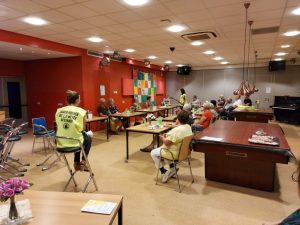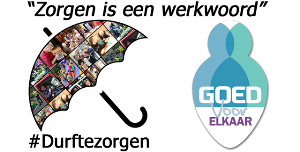Last time, the guest speaker was Denise Arnoldussen, geriatrician at ETZ Tilburg. The way in which the diagnosis of dementia can be made has been discussed.
In the case of cognitive complaints that affect daily actions and functioning, people come to the memory clinic in the hospital through a referral from their GP to the geriatrician. The diagnosis of dementia can be established through extensive testing, an interview and a physical examination. The four most common forms of dementia are:
– Alzheimer’s disease; start with memory problems, this form is most common. Then loss of other skills
– Vascular dementia; expresses itself in slowness in thinking, speaking and acting. Often due to strokes and tias
– Frontotemporal dementia; indicates change in behaviour, language or movement, later loss of memory.
– Lewy body dementia; manifests itself in concentration problems, including memory and movement problems. Often accompanied by hallucinations.
There is as yet no treatment to cure dementia. There are medications that may slow the progression. This can cause side effects and must be closely monitored.
A healthy lifestyle can certainly have a positive influence on the course of the disease. A lot of exercise, a healthy diet and mental activity can slow down the decline and ensure a better physical condition. It is difficult to determine whether someone has depression or dementia, because they show the same clinical picture. The medical specialist will determine what is wrong by means of an examination. Depression can be treated with medication after which memory often improves. There is no evidence that people who are depressed are more likely to develop dementia.
Questions about the future are diverse. It is mainly about what the future will look like. The course of the disease is very different in people with dementia, also in tempo. Important advice is to continue with the present life and be open to help that can be offered. The GP/practice nurse, the geriatrician and the dementia consultant/case manager play an important role in this regard. They can also provide support for carers. If you have questions about driving, a CBR test can be used to determine whether driving is still justified in the early stages of the disease. It is also important to record legal matters with the notary.
alzheimers cafe
The meetings of the Alzheimer Café in Oisterwijk .
–
Hearing a diagnosis of dementia is devastating. It turns out that there is still a lot of shame, people don’t like to talk about it. Fortunately, this taboo is being broken more and more, dementia is national disease No. 1. Due to the aging population, the number of people with dementia will continue to increase in the future. You can talk about this during the next Alzheimer Café Oisterwijk-Moergestel on
Tuesday, April 19. The theme is Dealing with dementia, guest speaker is Rianne Pijnenburg, dementia consultant in Oisterwijk. Dealing with dementia, how do you do that as a family member or carer? Among other things, it will be discussed which behavioral changes can occur in people with dementia. How can you deal with this? And what do you have to take into account.
The Alzheimer Café is a meeting place for people with dementia, young and old, for family members, friends, help and service providers and other interested parties. Fellow sufferers can mean a lot to each other, they recognize what the other is going through, and what this means for him or her. The support that those present give each other is of great value, and those present go home with a satisfied feeling.
Entry from 7.30 pm. Duration of the program from 20:00 – 22:00. Location De Coppele, Prunusstraat 69, Oisterwijk. Signing up is not necessary.
–



